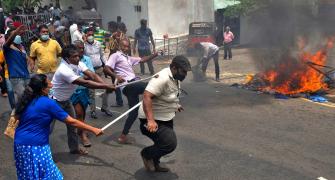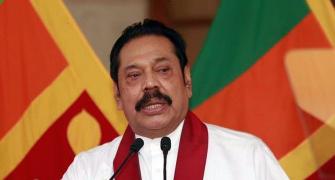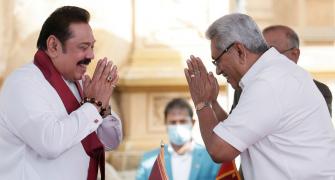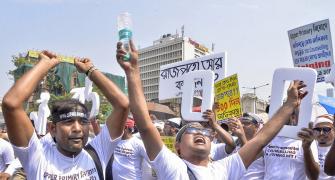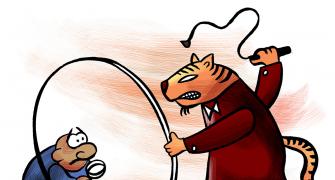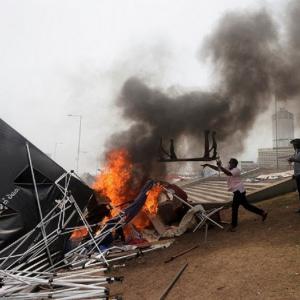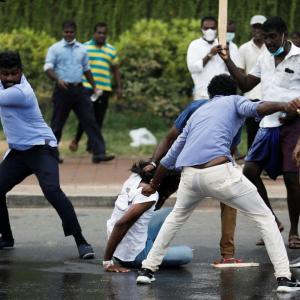Gota has to decide if he could order elder brother Mahinda's arrest as the agent provocateur of Monday's violence.
Then he has to prepare for an interim government, in which no one would now want to become a cabinet minister leave alone prime minister, explains N Sathiya Moorthy.
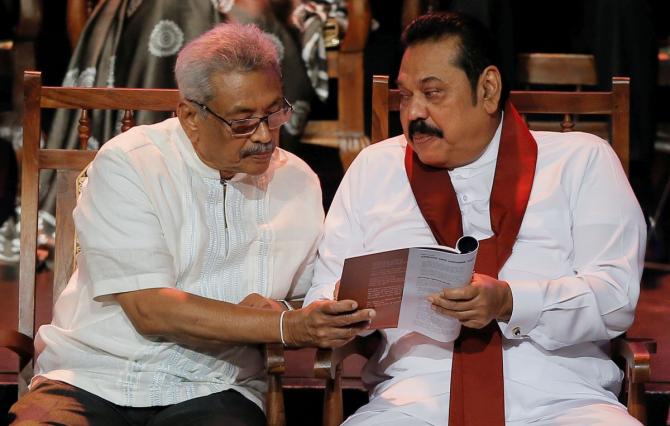
Sri Lanka is not new to mob violence, including those at the instance of ruling party politicians, but the one on Monday, May 9, is the first of the kind in the social media era.
Local media, including social media, carried it Live, first by fixing the blame for early violence on none other than outgoing prime minister Mahinda Rajapaksa, and explaining away the retaliatory violence on ruling party MPs and lower-level officials as retribution or expression of the people's pent-up anger against the Rajapaksas for the nation's economic ills of the past weeks in particular.
But neither the media, nor the political class, or the suffering population, remembered their personal and national economic plight even once. It will remain so for days and weeks to come -- reflecting the misplaced priorities that is ruling the roost for months.
Time was when after losing the presidential polls of 2015, the outgoing Mahinda saw crowds gather on either side of the road from capital Colombo all the way down to his native Medamulana village in southern-most Hambantota district, where thousands more had gathered to extend moral support to the man.
But on Monday, May 9, 2022, mobs set fire to the Rajapaksas' ancestral home in Medamulana, their father D A Rajapaksa's memorial, and Mahinda's personal home in the district-town of Kurunegala -- among a host of homes, properties and vehicles belonging to the SLPP (ruling Sri Lanka Podujana Peramnuna).
Even the prime minister's official residence, Temple Trees in Colombo, came under repeated attacks through the day and well into the night.
Finance Minister Ali Sabry, supposed to be the nation's chosen man of the hour, was not spared. His family home in western Puttalam came under attack.
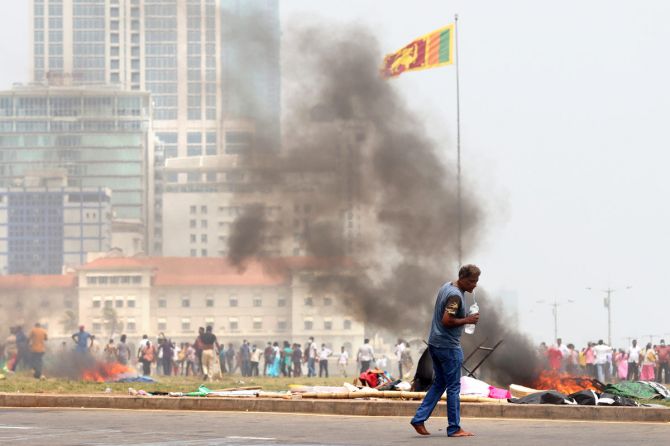
It all had begun at the same venue, the Temple Trees, where Mahinda had gathered his supporters from across the Sinhala South, to tell them that he would do everything that would be good to the people.
Everyone present knew that he was going to quit, but the way SLPP parliamentarians and party officials had brought in those people, both men and women, it is anybody's guess why the police did not take precautionary measures.
According to a section of the Sri Lankan media, the police had instructions from the ministry of internal security not to intervene, until that order was rescinded by President Gotabaya later in the day -- by which time it had become too late.
That it was all coming had been known for days and weeks. Those in the know of things were concerned, not about the inevitability and imminence of what happened, but only about the trigger.
If the mass protests, the 'people's movement', as dubbed by the local and international media and the diplomatic community in Colombo, would turn violent itself, or if would be an external mechanism that would set it off?
Even then, the focus was on 'friendly' anti-Rajapaksa groups, especially the left-leaning trade and university students' unions, whose entry had added new vehemence to the mass movement in recent days.
Their participation had also taken what was mostly a peaceful urban middle class protest of the Arab Spring kind on Colombo's Galle Face Green beach-front and other urban centres to the interior.

In fact, the protests had begun thus over a month ago, when the houses of ruling party MPs and ministers were targeted, but when the urban movement gained momentum and garnered media attention, the other ended -- for the time being, as has now become known.
It will require a detailed study by an 'independent' presidential commission of inquiry, if and when appointed, to come out with the truth, the whole truth and nothing but the truth, with regard to the men and modus behind the retaliatory violence.
On the provocative violence earlier, even without any inquiry it is clear that men who came to ask Mahinda not to quit were the cause. They came prepared to Colombo with clubs and rods, and did not spare their use once Mahinda had bid them adieu.
Now, leaders like former president Maithripala Sirisena and Tamil parliamentarian M A Sumanthiran want Mahinda arrested for inciting violence by his supporters. The irony is that those very mobsters were pleading for their lives with their attackers hours later, jumped into the Beria lake and hid elsewhere, to save their skins, souls and lives.
One of them, SLPP MP Amarakeerthi Athukorala died after opening fire at the anti-Rajapaksa retaliatory mobs. Both he and his bodyguard reportedly committed suicide to possibly escape mass lynching, but that needs to be probed too.
Otherwise, barring a couple of incidents, including one outside the prime minister's official residence in Colombo late Monday evening, when alone the police opened fire, the rest of them all were by private parties and their henchmen -- thus far identified only from the Mahinda supporter-groups in different parts of the country. Obviously, those among them who had weapons, registered or otherwise, were carrying them with them, and did not mind using them.
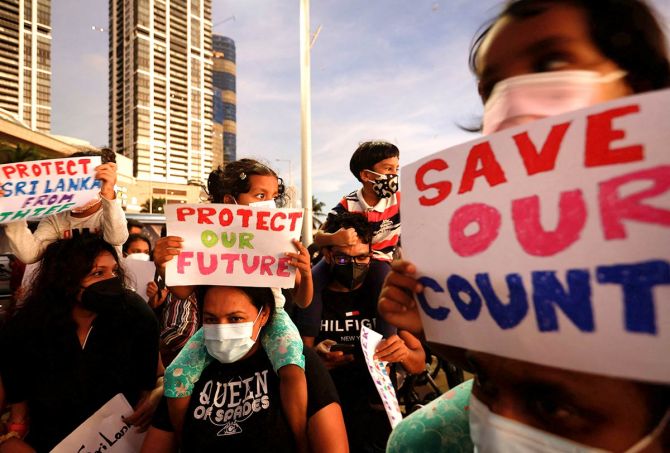
Did Mahinda Rajapaksa's over-confidence bordering on political arrogance did him in and became a contributing factor to Monday's violence, for which he and he alone would end up bearing the cross for all time to come?
A day before putting in his resignation, he had offered worship at the Maha Bodhi Buddhist shrine in Anuradhapura, where Emperor Ashoka's daughter Sanghamitra, locally known as Sangamitta, had planted the sapling from the Bo tree under which Lord Buddha had attained nirvana, or salvation.
It was his first visit outside Colombo and his native place over the past weeks of political confusion and tension. New reports had it that some in the Anuradhapura crowd jeered at him, others appealed to him to quit as prime minister, as they wanted to continue loving him for all the good that he had done them.
Yes, it is not for ending LTTE terrorism that the Sinhala South respects him. That is mainly an urban/semi-urban concept. In rural South, where his base anyway was, Mahinda as president had built roads, given drinking water and electricity connections, even while fighting the war in the North and the East, with the dreaded LTTE.
And when the South was burning, the North and East are relatively peaceful, the Tamil victims of the ethnic war, describing Monday's events as poetic justice for all their sufferings. That includes the destruction of the Rajapaksas' parents' memorials, in lieu of the army razing LTTE martyrs's memorials, post-war, claiming that they had hidden weapons below them.
It is anybody's guess how Mahinda got caught in a web that was not his making.
Under the constitution, the executive president has all the powers. The prime minister's is a ceremonial post, which Mahinda had held once earlier, from 2004-2005, under then president Chandrika-Bandaranaike Kumaratunga before becoming her chosen/elected successor.
All the controversial decisions that have cost the nation and the people in financial terms owed to Gota's inner circle of advisors, of whom Mahinda was not one.
Yet, when it came to finding a sacrificial goat, he became the convenient one, saving the skin of younger brother Gota, so very unwillingly and so very unconvincingly.

Where does that leave President Gota, and hence the nation too?
With Monday's violence, the demands for his exit too have increased. If he quits, then there would be a constitutional vacuum of a kind, as in the absence of a prime minister, parliament Speaker Mahinda Yapa Abeywardena steps in for three months, when the House elects an incumbent member as interim president for Gota's residual term, until November 2024.
That is the constitutional irony. The president is directly elected by the people, and can be a rank outsider, but his short-term substitute has to be an 'insider', from within parliament.
But for now, Gota's hands are full. His government has to contain the violence within hours, if not achieved already through nationwide curfew in place until Wednesday morning, if things were not to go out of hand more than already.
Through the past weeks, administrative confusion at the highest levels thanks mainly to the one-upmanship between the top two had demoralised and disincentivised the bureaucracy at all levels.
Added to that, the constant Western diplomatic condemnation of the police action against 'peaceful' protestors in some instances had stupefied the political leadership, which needed them for obtaining IMF assistance and also investments from their nations.
There were certain indications of organised protests outside of Galle Face Green, but it is not known if the intelligence department had kept track and alerted those on the ground.
In the past, the 2019 Easter serial blasts were attributed to the non-sharing of specific, actionable intelligence provided by Indian agencies, owing mainly to political egos and police-level turf-wars.
If proved again, it would be acknowledgement that something is really rotten in the state of Denmark, that too when there are indications of recurring unrest that could turn violent, pre-planned or otherwise.
In the immediate context, as president, Gota has to decide if he could order elder brother Mahinda's arrest as the agent provocateur of Monday's violence. Then he has to prepare for an interim government, in which no one would now want to become a cabinet minister leave alone prime minister.
Included in the list would be the 40 rebel MPs in three groups, who had aspired to return to the government only if Mahinda stepped aside. They should now be happy that Monday mobs spared them as they were not in the SLPP anymore.
In between, Gota has to get his May 6 Emergency proclamation ratified by parliament, by tabling it by the tenth day and getting it passed within the next three days. That's May 16-18, whereas parliament is scheduled to meet next only on May 17.
While Speaker Abeywardena could oblige on rescheduling the session, the president may have to step in himself to 'defend' himself and the government, over the events of the past months, culminating in the 'Black Monday' violence.
The question also is if Mahinda would break the SLPP parliamentary party and claim to be the official Opposition with more members than the Samagi Jana Balawegaya's Sajith Premadasa with his 54 MPs.
The safe surmise is that after Monday's mayhem, Mahinda may play safe, by not testing his personal popularity within the SLPP parliamentary group, or try and break the party.
That could be a breather for President Gota, yes, but that is not going to stop the Opposition from shouting even more for his resignation -- and the mass protests to return to the Colombo beach-front and all, with more police and military protection, if it came to that.
But then, no one is talking any more about the economy!
N Sathiya Moorthy, veteran journalist and author is a Chennai-based policy analyst and commentator.

